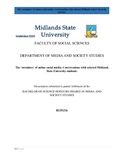Please use this identifier to cite or link to this item:
https://cris.library.msu.ac.zw//handle/11408/4074| Title: | The ‘socialness’ of online social media: Conversations with selected Midlands State University students. | Authors: | Moyo, Vanessa Y. | Keywords: | ‘socialness’ of online social media | Issue Date: | 2017 | Publisher: | Midlands State University | Abstract: | This study examines the socialness of online social media, specifically WhatsApp and Facebook. Literature (Papacharissi 2010, Bauman 2013), shows that online social media helps in creating communities, bonds, socializing and gatherings just like organic communities. Facebook users can claim to have hundreds of friends in their network, yet sometimes find it difficult to name half a dozen people that they have actually met in their local neighborhood. While social networks have helped people to meet like-minded contacts online, they have had a more limited role in developing face-to-face contact in communities. Online social media such as Facebook and WhatsApp are not communities in any singular sense, but rather function as social venues in which many different communities may form (Papacharissi 2010). Moreover, these sites carry expectations of sociability, meaningful connection to others, empathy and support (Papacharissi 2010). These are all characteristics of organic communities. Whether the actual interaction on these venues reaches the level of a “virtual community” depends on how one sees it and definition. She further asserts that the rhetoric of social network platforms often valorizes communal language and imagery as well. Facebook’s log in page pronounces, “Facebook helps you connect and share with the people in your life” describing itself as a place of connection and as a “community.” She further asserts that, the use of the internet, as a site of convergence with multiple technologies, becomes an asset depending on how it is used. The internet then serves as a instrument of communication, and does not affect social change. Students retain different levels of action, based on which they can use the internet to inconsistent ends uses and gratification. Papacharissi offers an oversight on how online social media aids in the formation and not fragmentation of communities, depending on its varied uses across. The study explores the perceptions of selected Midlands State University students towards the socialness of WhatsApp and Facebook platforms. In fact, I examine to see whether the students see these platforms as strengthening or fragmenting day-to-day physical interactions in organic communities. | URI: | http://hdl.handle.net/11408/4074 |
| Appears in Collections: | Bsc Media And Society Studies Honours Degree |
Show full item record
Page view(s)
432
checked on Jul 16, 2024
Download(s)
136
checked on Jul 16, 2024
Google ScholarTM
Check
Items in MSUIR are protected by copyright, with all rights reserved, unless otherwise indicated.




